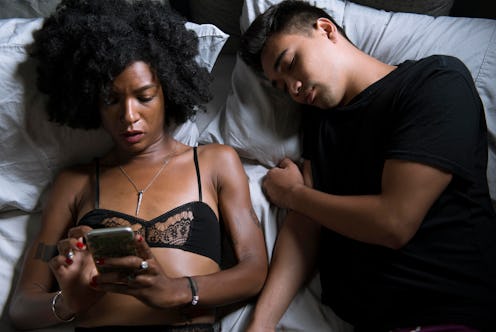Life
Here’s What A Sex Therapist REALLY Thinks About Snooping

Who hasn't been tempted to take a little peek at their partner's phone? While smartphones are machines that are technically separate from our bodies, they can also feel like an extension of our brains. And they’re an extension that lets us do a lot more than our brains can: watch porn, reach out to people on the other side of the world, have entire relationships on social media… You know the possibilities. So when a partner restricts access to a device or an account, for some people, it can be really scary! It’s like not knowing what’s going on in a part of your partner’s brain — and life. But is snooping ever OK?
A recent survey of 999 people conducted by the company ItsWorthMore found that the percentage of people with access increased the longer a couple was together, starting at 31.7% for people who’ve been with their partner for one to five months and ending at 61.9% for people who have been together for six or more years.
So what should we take away from that info? Relationship and sex therapist and educator Kristine Seitz, LSW, says that having access to your partner’s account isn’t necessarily a sign a that they’re trustworthy, and not having access isn’t a necessarily a sign of something else going on. In other words, there’s no way to say you “should” or “shouldn’t” snoop.
“All relationship dynamics can vary, but I tend to avoid having ‘should’ or ‘should not’ as variables, in general,” Seitz tells Bustle. “Expectations can be tricky and they can be a set up for disappointment. So, therefore, I don’t think access to devices or accounts is an expectation of a healthy relationship, and it’s certainly not an outright sign of worry.”
What it comes down to, then, is each individual relationship and the individual people in it. I know, I know — it’s not a very satisfying answer. It would be way easier if some expert could say everyone should have access to their partner’s devices or access is always an unnecessary violation of privacy.
But the real and honest truth is that people have different needs when it comes to privacy. While one person might be like, “Sure! Read all of my emails!” another person might want to throw up at even the thought of sharing their passcode. And that’s not to say one is hiding something and the other isn’t. It’s just about the different boundaries and expectations each person has about privacy.
Which brings us to snooping, because the likelihood that two people in a relationship are going to have the exact same boundaries and expectations around snooping is low. The issue of snooping is a fraught one. On the one hand, you have people who are very clear: Snooping is never okay. On the other hand, you have people who are also very clear: Snooping may be needed. And somewhere in the middle, you have advice like that given by sex and relationship advice columnist and podcaster Dan Savage: Snooping is justified — if you find something. So what are we supposed to think about snooping? Seitz says: it’s not a good idea.
“I think individuals may have reasons that seem to justify their snooping but, when it comes down to it, snooping is a transgression and a betrayal and can have the same consequences as other betrayals,” Seitz says. Additionally, Seitz says, the impulse to look at a partner’s device without permission — and the actual act of looking without permission — can be a sign that something else is going on in the relationship.
“If there is a sense of worry or jealousy, that may signify that more communication is needed,” Seitz says. “And it can also be helpful to see a therapist to begin to have better insight into their attachment style, their feelings, and their patterns that may be interfering with or sabotaging their relationships.”
Seitz adds that “uncertainty reduction theory” — which is the idea that not knowing something can make you feel really uncomfortable — can explain why some people snoop. Snoopers are trying to “fill in the gaps of the missing information.”
“Ambiguity and not knowing can cause the mind to wander and think of different possibilities of what might be happening,” Seitz says. “Ambiguity is a emotional enhancer and if there is worry about what a text or social media post or like means, we can often create meaning to things that are not true.”
Rather than snoop on a partner’s device or account, the most honest (and probably best for the long term health of your relationship) thing to do is talk about what’s driving you to want to. Are you feeling insecure? Are you jealous? Why? What’s at the root of those feelings? Those conversations can be difficult, but ultimately they’ll get you further — and be much more satisfying — than snooping through your partner’s phone.
This article was originally published on